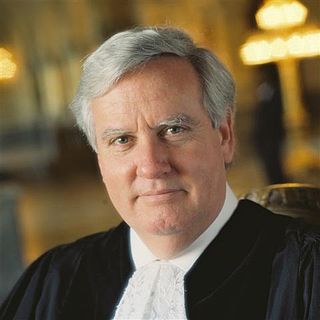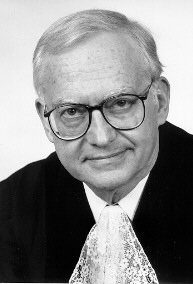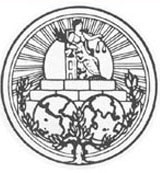
The International Court of Justice, or colloquially the World Court, is the only international court that adjudicates general disputes between nations, and gives advisory opinions on international legal issues. It is one of the six organs of the United Nations (UN), and is located in The Hague, Netherlands.

Sir Christopher John Greenwood is Master of Magdalene College, Cambridge and a former British judge at the International Court of Justice. Prior to his election, he was professor of international law at the London School of Economics and a barrister who regularly appeared as counsel before the International Court of Justice, the European Court of Human Rights, the English courts, and other tribunals.

Prince Sri Nagendra Singh was an Indian lawyer and administrator who served as President of the International Court of Justice from 1985 to 1988. He was the first Indian Judge at International Court of Justice and one among the four judges from India to have been Judges of the International Court of Justice in The Hague, the others being B. N. Rau (1952–1953), R. S. Pathak (1989–1991) the 18th Chief Justice of India, and Dalveer Bhandari (2012–), former Justice of the Supreme Court of India.
Nawaf Abdallah Salim Salam is a Lebanese politician, diplomat, jurist and academic who is the prime minister-designate of Lebanon.

United Nations Security Council resolution 595, adopted unanimously on 27 March 1987, after noting the death of International Court of Justice (ICJ) judge and Vice President Guy Ladreit de Laucharrière on 10 March, the council decided that elections to the vacancy on the ICJ would take place on 14 September 1987 at the Security Council and at the General Assembly's 41st session.

United Nations Security Council resolution 627, adopted unanimously on 9 January 1989, after noting the death of International Court of Justice (ICJ) President Nagendra Singh on 11 December 1988, the council decided that elections to the vacancy on the ICJ would take place on 18 April 1989 at the Security Council and at the General Assembly's 43rd session.

United Nations Security Council resolution 708, adopted unanimously on 28 August 1991, after noting the death of International Court of Justice (ICJ) President Taslim Olawale Elias on 14 August 1991, the council decided that elections to the vacancy on the ICJ would take place on 5 December 1991 at the Security Council and at the General Assembly's 46th session.

United Nations Security Council resolution 805, adopted unanimously on 4 February 1993, after noting the death of International Court of Justice (ICJ) judge Manfred Lachs on 14 January 1993, the Council decided that elections to the vacancy on the ICJ would take place on 10 May 1993 at the Security Council and at a meeting of the General Assembly during its 47th session.

United Nations Security Council Resolution 1914, adopted unanimously on 18 March 2010, after noting the resignation of International Court of Justice (ICJ) judge Shi Jiuyong and that the vacancy must be filled in accordance with the Statute of the ICJ, the Council decided that the election to fill the vacancy would take place on 29 June 2010 at a meeting of the Security Council and at a meeting of the General Assembly at its 64th session.

United Nations Security Council resolution 951, adopted without a vote on 21 October 1994, after noting the death of International Court of Justice (ICJ) judge Nikolai Konstantinovitch Tarassov on 28 September 1994, the Council decided that elections to the vacancy on the ICJ would take place on 26 January 1995 at the Security Council and at a meeting of the General Assembly during its 49th session.

United Nations Security Council resolution 979, adopted without a vote on 9 March 1995, after noting the death of International Court of Justice (ICJ) judge Roberto Ago on 24 February 1995, the Council decided that elections to the vacancy on the ICJ would take place on 21 June 1995 at the Security Council and at a meeting of the General Assembly during its 49th session.

United Nations Security Council resolution 980, adopted without a vote on 22 March 1995, after noting the resignation of International Court of Justice (ICJ) judge Sir Robert Yewdall Jennings which would take effect on 10 July 1995, the council decided that elections to the vacancy on the ICJ would take place on 12 July 1995 at the security council and at a meeting of the General Assembly during its 49th session.

United Nations Security Council resolution 1018, adopted unanimously on 7 November 1995, after noting the death of International Court of Justice (ICJ) judge Andrés Aguilar-Mawdsley on 24 October 1995, the Council decided that elections to the vacancy on the ICJ would take place on 28 February 1996 at the Security Council and at a meeting of the General Assembly during its 50th session.

United Nations Security Council resolution 1278, adopted without a vote on 30 November 1999, after noting the resignation of International Court of Justice (ICJ) judge Stephen M. Schwebel taking effect on 29 February 2000, the council decided that elections to the vacancy on the ICJ would take place on 2 March 2000 at the security council and at a meeting of the General Assembly during its 54th session.

United Nations Security Council Resolution 1926, adopted unanimously on June 2, 2010, after noting the resignation of International Court of Justice (ICJ) judge Thomas Buergenthal with effect from September 6, 2010. The Council decided that the election to fill the vacancy would take place on September 9, 2010 at a meeting of the Security Council and at a meeting of the General Assembly.

United Nations Security Council resolution 1361, adopted without a vote on 5 July 2001, after noting the resignation of International Court of Justice (ICJ) judge Mohammed Bedjaoui taking effect on 30 September 2001, the council decided that elections to the vacancy on the ICJ would take place on 12 October 2001 at the security council and at a meeting of the general assembly during its 56th session.

United Nations Security Council resolution 1571, adopted without a vote on 4 November 2004, after noting the resignation of International Court of Justice (ICJ) judge Gilbert Guillaume taking effect on 11 February 2005, the council decided that elections to the vacancy on the ICJ would take place on 15 February 2005 at the security council and at a meeting of the General Assembly during its 59th session.
The 2011 International Court of Justice election began on 10 November 2011 at United Nations Headquarters in New York City. In the set of triennial elections, the General Assembly and the Security Council concurrently elect five judges to the Court for nine-year terms, in this case beginning on 6 February 2012. From the eight candidates, the five winners were Giorgio Gaja (Italy), Hisashi Owada (Japan), Peter Tomka (Slovakia), Xue Hanqin (China) and Julia Sebutinde (Uganda).
The 2017 International Court of Justice election took place from 9 to 20 November 2017 at the United Nations Headquarters in New York City. In the set of triennial elections, the General Assembly and the Security Council concurrently elect five judges to the Court for nine-year terms, in this case beginning on 6 February 2018. From the seven candidates, the five winners were Abdulqawi Yusuf (Somalia), Antônio Augusto Cançado Trindade (Brazil), Nawaf Salam (Lebanon), Ronny Abraham (France) and Dalveer Bhandari (India).

United Nations Security Council resolution 2638 was adopted without vote on 22 June 2022. After noting with regret the death of International Court of Justice (ICJ) judge Antônio Augusto Cançado Trindade on 29 May 2022, the Council decided that elections to the vacancy on the ICJ would take place on 4 November 2022 at the Security Council and at a meeting of the General Assembly during its 77th session.












